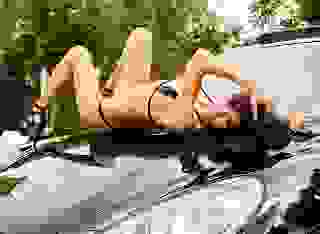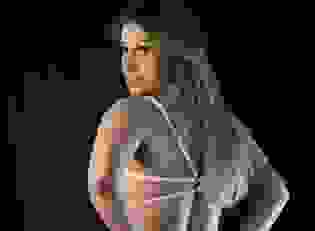- Romance
- Between the Lines
- Page 4
Note: You can change font size, font face, and turn on dark mode by clicking the "A" icon tab in the Story Info Box.
You can temporarily switch back to a Classic Literotica® experience during our ongoing public Beta testing. Please consider leaving feedback on issues you experience or suggest improvements.
Click hereAnd yes, the older man was still there, and still looking right at him -- only now he was using binoculars.
'Well, time to force their hand,' he thought, but first he walked around the perimeter of the roof looking for other surveillance units -- but nothing out of the ordinary stood out. Yet.
Brad seemed agitated so he walked back to their table and tried to pick up the key points in the conversation he was having on the phone, but just then a waitress came over and handed out menus.
"What do you recommend up here this time of day?" Lawton asked, still keeping an eye on Brad.
"The shrimp remoulade is really popular," the young girl said absent-mindedly -- until she looked up and saw she was addressing Mr Peter Lawton, the big-shot news anchor -- at which point she seemed to go weak in the knees, "and we have a special today, a red snapper with a crab stuffing."
Lawton was hungry and he knew Angela had skipped over most of her breakfast, so he ordered four shrimp appetizers and four snappers and a chilled Pinot Grigio. He waited until the waitress walked off then he sat next to Angela and let slip a long, drawn-out sigh. "You know, you kind of get to a point where you expect this kind of shit to happen -- when you're walking around Moscow or maybe Tirana. But not in Jackson fuckin' Mississippi."
"Ya know, you're right," Angela said. "But this just doesn't make any sense. None at all..."
Brad rang off and put away his phone, and Lawton noted the kid looked a little upset.
"What's happened, Brad?"
"Polk and Washburn just had their bail hearings. Both were denied bail and, well, we missed it, didn't we?"
"The hearing? Yeah? So what? That was pretty much a foregone conclusion."
"The station manager wants to fire me and Carol," Brad said, his head hanging low.
Carol nodded. "That figures. Kolb has been gunning for me all year," she sighed -- then she looked at Peter. "Think they'll come after you too?"
"Wouldn't be too surprised."
Angela looked at his face carefully then. "I guess the question is, Peter, do you still give a damn?"
"You know, that's a funny thing...but I'm not actually sure I ever 'gave a damn' about this job. To me, it was always the story, the truth of things. Whatever I was working on -- the truth of things had to matter or the story was just fluff -- and I guess that's why I gave up the anchor desk. I was reading the news that other reporters had worked their asses off to get to my desk, but I can't tell you how many times I was left to ask the important questions myself. The hard questions. Like the reporters we had out there often didn't know their jobs, and there were some big stories brewing that they were simply not covering."
"I always wondered what happened," Angela said. "People work their whole careers to get where you were, but you just turned away from it all and walked away."
Lawton nodded. "Times change. Hard news used to sell; now opinion sells. The thing is, my opinion isn't any better or worse than the next guys -- unless I've gone out looked for the facts. Then my job is to report those facts, or at least that's what it used to be, because opinions don't mean a damn thing. Now you turn on your favorite channel and you know exactly what you're going to get, even before you sit down to watch. Maybe, Carol, the real question is what exactly does a reporter do in a situation like the one we're in right now?"
Carol smiled and began: "Cassius was right; the fault dear Brutus is not in our stars, but in ourselves..."
"Goodnight and Good Luck," Carol and Peter quoted in unison.
"They have nothing left to sell now, do they?" Angela added. "No policies, just hate."
"...Nothing to fear but fear itself," Peter added.
"What are you two talking about?" Brad said.
"Edward R Murrow and how Joseph McCarthy used fear of communism to divide people in the 50s. Seems like the Republicans are going back to their old playbook one more time."
"Didn't they do it once before? Back in the 30s?" Angela asked.
And Lawton nodded. "Oh yeah, with the Tucker Carlson of his day, Father Charles Coughlin, the Catholic radio priest, who just happened to be a rabid anti-Semite. In the years leading up to the Second World War, he preached the idea that the US should team up with Nazi Germany to purify the world of Jews. Funny how times have changed, too, because Roosevelt actually shut his radio program down. He couldn't get away with that now."
"Wasn't that the problem with Germany in the 20s?" Carol asked. "That the government got too liberal and Hitler took advantage of it?"
Lawton shrugged. "Yeah, I think it was Article 50 of the Weimar Constitution, but it's an age-old problem, Carol. If you allow free speech, when does some speech 'cross the line' -- and who gets to decide if it does? We've allowed Neo-Nazis to march for their cause -- in the name of protecting everyone's right to free speech, but should a government allow speech that aims to destroy the foundations of that government? Hitler and Mussolini both used such permissive legal landscapes to sow division and cause the ultimate collapse of their own national governments and now it looks like that's exactly where we've found ourselves."
"So," Angela sighed, "the question then becomes one of degrees, doesn't it? Do you maintain an absolute right to free speech in all instances, or do you place limits on that right?"
"Well, we already do," Lawton said. "Common sense stuff, like it's against the law to run into a crowded theatre and yell 'Fire!' But once you cross the line into curtailing political speech our constitution is really very clear: You can't do it. You must not curtail such speech, no matter how detrimental it is to the country, as long as such talk doesn't openly incite insurrection or sedition."
"Yeah," Brad growled, "we've already seen how well that turned out. Seems like certain people with enough money bought all the justice they needed." And as Brad finished talking his phone chirped again. "Oh boy, here we go."
"Your dad?" Lawton asked, his voice a low whisper.
Brad nodded, then he listened to his father -- but he soon started to grow pale, and then his left eye started twitching. "Are you serious?" he whispered at one point, but then he listened for several more minutes, at one point asking someone for a pen and paper.
Their shrimp appetizers came and Lawton was too hungry to wait so he piled in, and so then Angela did as well; Brad rang off a minute later and nodded slowly then grabbed his cocktail fork and ate in silence. Carol gave up and joined them, but she noticed Brad was waiting until everyone else was out of earshot before speaking.
And without looking up from his plate he mumbled: "Something big is brewing."
"Big?" Lawton asked. "What do you mean...big?"
"Big. Apparently, some Black cops and sheriff's deputies are pissed off about this and it's spread to the state National Guard. Dad's heard that they're going to try and get both of 'em out of jail..."
"What does that mean?"
"Sorry. They're planning on breaking them out."
"And who the hell else knows about this?"
Brad nodded. "The governor does, the commanding general of the state guard does too..."
"And if they know," Lawton sighed, "that means everyone knows. From the local Chief of Police on up to the White House."
"So what?" Brad snorted. "Eighty percent of the people in this city are Black, so you can reckon on about a hundred and fifty thousand really pissed off people getting involved. But have you thought about what might happen if all those folks get riled up and start carrying torches towards City Hall?"
"Or AR-15s," Carol mumbled, starting to frown.
"It would make Kent State look like a party," Lawton sighed, "but that would also be playing right into the Coalition's hands. The National Guard was formed in large measure to put down this kind of domestic unrest."
"Funny how they didn't show up at the capital on January Sixth," Angela smiled.
"Lots of funny things about that day," Carol added, "starting with Michael Flynn..."
Lawton held up his hands. "Stop it, would you? There's no need to run down that rabbit hole right now, is there? Brad, what does your father think we need to do?"
"Get ready to get the fuck out of Dodge, Mr Lawton. He hasn't heard anything about you in particular, but he thinks they'd like to discredit you somehow. Kind of like take out two birds with one stone...that kind of thing. The one thing that seems to be bothering my old man has to do with the National Guard. He's checking now, but it sounds like the Guard wants violence. He called it a flash point."
"How nice," Lawton sighed -- just as their waitress arrived with plates of fish. His phone chirped then and he smiled at the waitress as he pulled his phone from an inside pocket, and he saw the Caller ID displayed 'unknown name, number blocked' -- but for some reason he decided to take the call.
'Hello?' he said.
'Lawton?'
'That's right.'
'Be in the station's van on Congress Street by the jailhouse steps. Tomorrow, 2100 hours.'
Then the line went dead.
Lawton looked up and sighed.
"Who was that?" Brad asked.
Lawton shrugged. "I'm not sure, but my guess is it may have been the military. They want us in the station's mobile transmitter van tomorrow night, parked by the jail at 2100 hours."
"2100 hours?" Angela muttered. "That's military time over here, isn't it?"
"What?" Angela cried. "You can't be...but Peter, why...it's such an obvious trap?"
He nodded. "Yeah, sure it is, but this is the first move on the board, isn't it? Which means this is the story they want to get out, that a couple of liberal reporters broke two Black prisoners out of jail. But obviously, this isn't the real story. No, now they want this part of the story to go away, but we can't let that happen."
"What's the real story?" Carol said, looking unsure of herself now that she was unemployed.
Lawton leaned back in his chair and crossed his hands behind his head, then he looked up at the sky...and there it was. A small drone, watching everything they did.
He quickly looked down, then spread his hands wide. "The real story? Well they got these laws passed but they're not real popular. Still, they worked for decades to repeal Roe and they're not going to give it up without a fight..." He closed his eyes, then shook his head slowly. "Without a fight," he muttered slowly, carefully. "And Brad's dad says they want a fight. The fight, the big fight. They want all the Blacks to come out tomorrow night, they want them to come down here. That's the real trap. Gather a mob, get them angry, then supply the spark to set them off. The flash point, I guess."
"Okay, a spark...but like what?"
"My guess is they know those girls are going to be in the van with us, so then they force us to go on the run. Then they stop us and take us out, preferably right in front of an angry crowd and, of course, probably carried live."
"But...why?"
"You turn the tables. Riots start, but instead of two martyrs going to trial you now have two escaped convicts on the run -- but neatly done away with, and in the process you reestablish violent control over a large swath of population you want out of the way."
"You mean 'put them back in their place,' don't you?" Carol said.
Lawton nodded. "Boxed up, cut off, and politically isolated, as in Jim Crow version 2. Nothing will turn the 'undecided' voters quicker than having their most repressed fears legitimized, as in thousands of armed Black rioters torching cars and businesses over a couple of escaped cons, but then again the same thing happened after the Rodney King riots in LA. I guess the thinking goes the moderates will want all those rioters either shot and killed or picked up and shipped off to prison camps. It'll be the media's job to present images of burning cities and pissed off Blacks -- then all that chaos and disorder will be neatly juxtaposed with more images of troops and order restored."
Angela crossed her arms over her chest and sighed. "Aren't you forgetting something, Peter?"
"No, I don't think so. And I think I know what you're going to say, too. It's not our job to make the news, it's our job to report it. I hear you, and I get that. But Angela, we didn't start this, did we? They get to make the first move. The question is, how do we counter that move?"
Carol looked at Lawton again: "We get the word out to the Black community that they're being set up again..."
"They're not going to care," Brad sighed. "If those two girls are killed -- and it won't matter by who -- then this city is going to go up in flames."
"It won't stop here," Angela said. "Hitler did the same thing, you know. Staged events like this, had film crews on hand..."
"Social media will do the job this time. They won't need us anymore," Carol countered. "Images and videos will go viral within minutes, rioting will spread to other cities..."
Lawton nodded. "And that's exactly why the Right doesn't want to restrict social media. Political violence, uncut and unedited, plays right into their hands."
"So, what do we do?" Brad asked.
"Sorry kid, but you're going to have to tell me a little more about your dad."
Brad nodded, but then he looked away. "Where do you want me to start?"
"Why don't you begin by telling us why you're so afraid of him..."
Fifth Act
The station's transmitter vans were, like most iterations of the current design, based on a modified C-Class RV chassis, and the Jackson network affiliate had six Mercedes Sprinter-class vans in service that afternoon. With their large, rotating two-way satellite receive and transmit antennas folded flush to the van's roof, there was no mistaking what they were, or what their purpose was, and when people saw these vans pull up to the scene of a crime they assumed they were there to cover a big story.
And so it was that day. In fact, the three major legacy networks had multiple vans parked outside of the County Jail, and so did CNN and Fox, and all the networks were on hand because bail had been denied two days before, and racial tensions were simmering once again in Jackson, Mississippi. Civil rights leaders had arrived on jets from Atlanta and local pastors had summoned their flocks to meet down by the courthouse that evening, and now the air was electric -- even if it was filled with malignant expectation.
The network's vans were fairly conventional, too. The rear doors opened onto banks of power generators needed to send AV transmissions to satellites in low earth orbit, but those same generators also powered the bulky video cameras the networks still relied on for ultra-high quality video, as well as the banks of floodlights needed to illuminate both the reporters and the scenes they reported from. The middle of these vans were filled floor to ceiling with powerful mobile editing suites, and an editor worked with the producer to shape the contours of any given story from the seats there. Up front, the cameraman acted as driver, while the Face, otherwise known as the Onscreen Talent, sat in the passenger seat, for the most part reading the storyline developed by the producer in order to be able to ask questions that fit the narrative arc of the story they were reporting on.
The Hinds County Courthouse is one of these monstrous gray concrete affairs put up in the 50s and that always seem to exude a certain brooding sense of purpose, for the people within such buildings are in the business of processing criminals and preparing to pronounce them guilty so they can begin their journey into and through the penal system. Immediately next to the courthouse is the Hinds County Jail, a modern tan brick structure designed by an architect who was in love with drawing 45-degree angles, and between the courthouse and the jailhouse -- on the ground level -- was a sally-port, a covered garage area where prisoners could be unloaded away from the prying eyes of reporters and the idly curious.
A still employed Brad McNaughton drove van number C-124 east along Pascagoula Street, then made a right onto Congress and parked in the space indicated by the mysterious voice, but within a half hour every transmitter van in the region arrived, and for some strange reason they too parked on Congress Street, and this was like leaving a piece of chocolate to melt on a hot sidewalk. Soon, many of the people called upon by civil rights leaders and local pastors to gather downtown saw all the network vans parked on Congress so every one of these huge, jostling crowds decided to head up Congress Street, and within a half-hour more than ten thousand very angry people were milling about the streets surrounding the Hinds County Courthouse.
Judges about to leave for the day looked out their windows and instead of seeing lawyers and paralegals heading home now saw huge crowds of very angry Black people, most carrying signs decrying the unjust situation in the jail. These judges became upset by the sight and so they called the police. And the police were more than ready for the call, so their response was sudden and massive.
And at that point, three Black Sheriff's Deputies came down the steps leading out of the jail, and they were leading two Black women to the van driven by McNaughton. They stopped and opened the van's side doors and then walked off into the crowd, and many people now seemed confused. Not coincidentally, several hundred White people appeared on Congress Street, and the shouting began.
Washburn and Polk had no idea what was happening to them, only that now they were in a van surrounded by technical equipment they barely understood. Yet once the doors were slammed shut McNaughton drove away from his parking place, but crucially, so too did five other network transmitter vans. A large street fight was just getting underway too, and the mood on the street had suddenly turned dark and ugly, yet in the confusion the van stopped in the middle of the street and the side door opened again.
And Peter Lawton was standing there, smiling. "Ladies, it's time to leave."
And Brad resumed driving. Yet no one noticed that all six vans driving away appeared to be owned by the same network, or that the number on the side of each van was C-124, and neither did the two police officers in the marked patrol car that pulled out behind the group of vans. Soon the vans started changing positions and breaking away from the formation, but by that point, the police officers knew that something was up. They immediately radioed for back up and within ten minutes all six vans had been located and were being tailed.
McNaughton's van was one of the first to be pulled over, and the two officers roughly removed him from the van before they searched it -- yet they found no escaped prisoners inside.
And within a few minutes the remaining vans had all been pulled over and searched -- and still no escaped prisoners were found...
...because Fay Polk and Elise Washburn were now inside a school bus surrounded by dozens of other Black women -- and two White reporters -- and that this bus, along with several more just like it, was headed out Medgar Evers Boulevard to the Medgar Ever's House National Monument, where a giant rally was scheduled to start at nine that evening.
But one school bus broke off from the convoy and doubled back to Woodrow Wilson Avenue and that bus then drove out to Hawkins Field Municipal Airport, and the two Black women and the two White reporters exited the bus and walked directly out to a waiting Beech King Air 360ER that was registered out of the Bahamas, and within minutes the aircraft took off and turned to the east-southeast, flying directly over downtown Jackson...
...where word was spreading that the girls had escaped and were now on the loose somewhere in the city. And all the civil rights leaders, many friends of Peter Lawton, and all the local pastors called for a peaceful march out to the Evers house...








